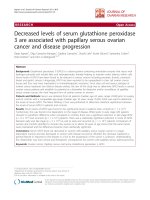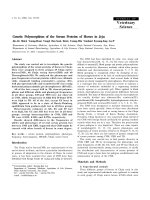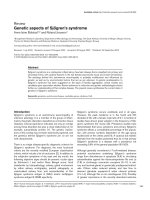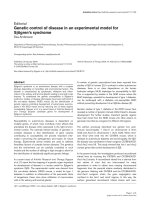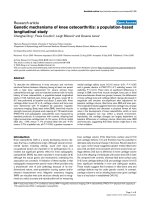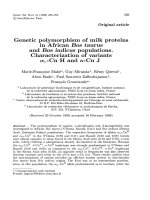Báo cáo y học: "Genetic polymorphism of p53, but not GSTP1, is association with susceptibility to esophageal cancer risk – A Meta-Analysis"
Bạn đang xem bản rút gọn của tài liệu. Xem và tải ngay bản đầy đủ của tài liệu tại đây (816.31 KB, 9 trang )
Int. J. Med. Sci. 2010, 7
300
I
I
n
n
t
t
e
e
r
r
n
n
a
a
t
t
i
i
o
o
n
n
a
a
l
l
J
J
o
o
u
u
r
r
n
n
a
a
l
l
o
o
f
f
M
M
e
e
d
d
i
i
c
c
a
a
l
l
S
S
c
c
i
i
e
e
n
n
c
c
e
e
s
s
2010; 7(5):300-308
© Ivyspring International Publisher. All rights reserved
Research Paper
Genetic polymorphism of p53, but not GSTP1, is association with suscepti-
bility to esophageal cancer risk – A Meta-Analysis
Yaping Zhao
1,*
, Furu Wang
2,3,*
, Shunlin Shan
4,*
,Yiqi Zhao
5
, Xueming Qiu
6
, Xiangyang Li
4
, Feng Jiao
5
, Jian-
guo Wang
4
, Yunxiang Du
4
1. Department of Laboratory, The 82th Hospital of the People’s Liberation Army, Huaian 223001,China;
2. Department of Epidemiology and Biostatistics, Cancer Center, Nanjing Medical University, Nanjing 210029, China;
3. JiangSu Provincial Center for Disease Prevention and Control, Nanjing, 210009, China;
4. Department of Oncology, The 82th Hospital of the People’s Liberation Army, Huaian 223001, China;
5. Department of Surgery, The 82th Hospital of the People’s Liberation Army, Huaian 223001, China;
6. Department of Gastroenterology, The 82th Hospital of the People’s Liberation Army, Huaian 223001, China.
* These authors contributed equally to this work.
Corresponding author: J. Wang: Tel. +86-0517-8356-8701; Fax +86-0517-8377-1001; email: Y. Du: Tel.
+86-0517-8356-8701; Fax +86-0517-8377-1001; email:
Received: 2010.07.25; Accepted: 2010.08.31; Published: 2010.09.01
Abstract
A number of studies have evaluated two functional polymorphisms on p53 Arg72Pro and
GSTP1 Ile105Val, in relation to esophageal cancer susceptibility. However, the results remain
conflicting rather than conclusive. This meta-analysis on 2919 cases and 4074 controls for p53
Arg72Pro and 1885 cases and 2194 controls for GSTP1 Ile105Val from 13 published
case-control studies showed that no significant general main effects for GSTP1 Ile105Val on
esophageal cancer risk. However, we found that the p53 Arg72Pro was associated with an
increased risk of esophageal cancer ((Pro/Arg +Pro/Pro) versus Arg/Arg: OR=1.20,
95%CI=1.06-1.36) without any between-study heterogeneity.
In the stratified analysis by ethnicity, we found that the increased esophageal cancer risk
associated with p53 Arg72Pro polymorphism was more evident in Asian group ((Pro/Arg
+Pro/Pro) versus Arg/Arg: OR=1.35, 95%CI=1.14-1.60, P=0.09 for heterogeneity test), al-
though we still failed to find any significant association between GSTP1 Ile105Val polymor-
phism and esophageal cancer risk in different ethnicity. These results suggest that p53
Arg72Pro polymorphism, but not GSTP1 Ile105Val, may contribute to esophageal cancer
development, especially in Asian. Additional well-designed large studies were required for the
validation of this association.
Key words: p53, GSTP1, polymorphism, esophageal cancer, meta-analysis
Introduction
Esophageal cancer, the sixth most common cause
of cancer-related death in the world, occurs with in-
creased frequency in specific regions. [1] Survival
rates for esophageal cancer are poor; 75% of patients
die within 1 year after diagnosis, and the 5-year sur-
vival rate is only 5–10% .[1] The development of eso-
phageal cancer is a multifactorial process associated
with a variety of risk factors. Cumulative evidence
suggests that tobacco smoking, heavy alcohol drink-
ing, micronutrient deficiency, and dietary carcinogen
exposure may cause the disease.[2-5] However, even
in the at-risk population, only a portion of exposed
individuals develop the cancer in their life span, in-
Int. J. Med. Sci. 2010, 7
301
dicating that there may be important genetic basis
rendering such individuals susceptible to the disease.
The tumor-suppressor gene p53 is important for
cellular growth control once the DNA is subject to
damage or mutation and arrests the cell cycle in the
G1 phase to allow DNA repair or apoptosis.[6] Its
mutation is widely detected in all types of cancer,
including esophageal cancer.[6,7] It is now clear that
disruption of p53 pathway, such as through inacti-
vating p53 mutations, is associated with the formation
and progression of malignancies. For example, it has
been shown that >50% of human tumors have inacti-
vating p53 mutations.[8]
Glutathione S-transferase P1 (GSTP1) is quanti-
tatively the most important GST isoform in normal
esophageal epithelium.[9] GSTP1 expression, GSTP1
mRNA levels, glutathione content and GST enzyme
activities are all reduced in BE (Barrett esophagus)
compared with normal esophageal epithelium.[9-13]
Because accumulating evidence indicates p53 and
GSTP1 play central role in cancer formation and pro-
gression, one may reason that functional single nuc-
leotide polymorphisms in these genes might render
the carrier susceptible to cancer, including esophageal
cancer.
It was reported that the p53 gene is polymorphic
and among its single nucleotide polymorphisms, a
G>C change at codon 72 (rs1042522) results in
Arg>Pro amino acid substitution.[14] Although both
variants are morphologically wild-type, the Pro/Pro
genotype is less effective in suppressing cellular
transformation.[15] Several studies have reported that
the p53 codon 72 polymorphism may be associated
with tumor susceptibility to a variety of cancers re-
cently.[16-18] The GSTP1 gene displays a polymor-
phism, an A>G change at codon 105, resulting in an
Ile-to-Val substitution (rs1695), which alters the en-
zymatic activity of the protein.[18] This has been
suggested as a putative high-risk genotype in various
cancers.[19] Therefore, it’s reasonable to hypothesize
that the p53 Arg72Pro and GSTP1 Ile105Val poly-
morphisms may functionally related to the risk of
esophageal cancer.
A number of molecular epidemiology studies
have been conducted to examine the association be-
tween p53 Arg72Pro, GSTP1 Ile105Val polymor-
phisms and esophageal cancer susceptibility [19-33],
but the results remain inconsistent. To estimate the
overall risk of p53 Arg72Pro, GSTP1 Ile105Val asso-
ciated with esophageal cancer risk and to quantify the
potential between-study heterogeneity, we conducted
a meta-analysis on 13 published case-control studies
with 2919 cases and 4074 controls for p53 Arg72Pro
and 1885 cases and 2194 controls for GSTP1 Ile105Val.
Materials and Methods
Identification and Eligibility of Relevant Stu-
dies. We attempted to include all the case-control
studies published to date on the association between
p53 Arg72Pro, GSTP1 Ile105Val polymorphisms and
esophageal cancer risk. Eligible studies were identi-
fied by searching the electronic literature PubMed for
relevant reports (last search update February 2010,
using the search terms “p53”, “polymorphisms” and
“esophageal cancer”; “GSTP1”, “polymorphisms”
and “esophageal cancer”). Additional studies were
identified by hands-on searches from references of
original studies or review articles on this topic. If stu-
dies had partly overlapped subjects, only the one with
a larger and/or latest sample size was selected for the
analysis.
Data Extraction. Two investigators indepen-
dently extracted data and reached a consensus on all
of the items. Data extracted from these articles in-
cluded the first author’s name, year of publication,
country of origin, ethnicity, number of cases and con-
trols, genotype frequencies for cases and controls.
Meta-Analysis. The risk of esophageal cancer
associated with p53 Arg72Pro, GSTP1 Ile105Val po-
lymorphisms were estimated for each study by odds
ratio (OR) with 95% confidence intervals (95%CI). For
all studies, we evaluated the risk of the variant geno-
types (Pro/Pro, Val/ Val), compared with the
wild-type genotype (Arg/Arg, Ile/ Ile). Then we cal-
culated the ORs of the polymorphisms, using both
dominant and recessive genetic models of the variant
72Pro and 105Val alleles. In addition, we conducted
stratification analysis by ethnicity. The χ
2
-based Q
statistic test was used for the assessment of hetero-
geneity, and it was considered significant for P < 0.05.
We used the fixed-effects model and the ran-
dom-effects model based on the Mantel-Haenszel
method and the DerSimonian and Laird method, re-
spectively, to combine values from each of the studies.
When the effects were assumed to be homogenous,
the fixed-effects model was then used; otherwise, the
random-effects model was more appropriate. We also
computed the power of the selected studies by using
the DSTPLAN4.2 software, in order to assess the
probability of detecting an association between
RANTES polymorphisms and asthma at the 0.05 level
of significance, assuming a genotypic risk of 2.0 and
1.5. The Egger’s test and inverted funnel plots were
utilized to provide diagnosis of publication bias (Li-
near regression analysis, ref.[34] All analysis was
done by using the Statistical Analysis System software
(v.9.1.3, SAS Institute, Cary, NC) and Review Manage
(v.4.2). All the P values were two-sided.
Int. J. Med. Sci. 2010, 7
302
Results
The selected study characteristics are listed in
Table 1 and Table 2. All studies indicated that the
distributions of two polymorphism’s genotypes in the
controls were both consistent with Hardy-Weinberg
equilibrium except for one study [26]for p53
Arg72Pro, and one studies [21] for GSTP1 Ile105Val.
Considering the representation of samples, which
may directly result in untruthful effect, we excluded
these studies [21,26] with a departure from Har-
dy-Weinberg equilibrium from our analysis. As a re-
sult, 6 case-control studies (2919 cases and 4074 con-
trols) for p53 Arg72Pro and 9 studies (1885 cases and
2194 controls) for GSTP1 Ile105Val were available for
this meta-analysis. The minor Pro allele (for p53
Arg72Pro) and Val allele (for GSTP1 Ile105Val) fre-
quency (MAF) were 0.44 and 0.20 for Asian studies,
while around 0.60 and 0.32 for Mix and Caucasus
populations, respectively.
Table 1. Characteristics of published studies on p53Arg72Pro included in the meta-analysis
Author (ref*) Year Origin Ethnicity SNP
site
Sample size
(case/control)
HWE MAF
in controls
Genotypic ORs
&
Power (%) †
homozygotes/
heterozygotes
OR>1.5 OR>2.0
Lee JM[22] 2000 China(Taiwan) Asian p53 Arg72Pro 90/254 0.427 0.40 2.56/1.86 37.5 80.2
Vos M[23] 2003 South Afican African p53 Arg73Pro 73/115 0.216 0.41 0.44/0.96 27.0 63.5
Hong Y[24] 2005 China Asian p53 Arg74Pro 758/1420 0.105 0.44 1.77/0.99 99.4 100.0
Cai L[25] 2006 China Asian p53 Arg75Pro 204/389 0.107 0.47 2.25/1.43 64.8 97.7
Yang W[26] 2008 China Asian p53 Arg76Pro 435/550 0.000 0.32 0.39/0.07 86.0 100.0
Liu G[27] 2009 United States Caucasian p53 Arg77Pro 302/453 0.066 0.26 1.05/01.18 70.6 99.2
Canova C[19] 2009 European Caucasian p53 Arg78Pro 1492/1443 0.660 0.73 1.00/0.95 99.6 100.0
* The ref was referred to the reference numbers in this study.
&
data from the same source, so selected by the latest sample size.
#
NA: Not available.
&
Genotypic odds ratios for homozygotes and heterozygotes.
†
Power was calculated by the DSTPLAN4.2 software with MAF in controls as the frequency of risk factor, OR was selected 1.5 and 2.0 as the
relative risk and а=0.05 as the significance.
Table 2. Characteristics of published studies on GSTP1I le105Val included in the meta-analysis
Author (ref*) Year Origin Ethnicity SNP
site
Sample size
(case/control)
HWE MAF
in controls
Genotypic ORs
&
Power (%) †
homozygotes/
heterozygotes
OR>1.5 OR>2.0
Lin DX
&
[28] 1998 China Asian GSTP1
Ile105Val
42/36 0.359 0.24 0.25/0.83 12.3 28.9
Morita S[29] 1998 Japan Asian GSTP1
Ile106Val
66/164 0.412 0.16 0.26/0.19 19.2 49.2
van Lieshout EM[30] 1999 The Netherlands Caucasian GSTP1
Ile107Val
34/247 0.739 0.23 3.65/3.44 16.4 40.7
Tan W
&
[31] 2000 China Asian GSTP1
Ile108Val
150/150 0.616 0.22 1.47/0.89 33.5 77.1
Lee JM[22] 2000 China(Taiwan) Asian GSTP1
Ile109Val
90/254 NA
#
NA
#
NA
#
/ NA
#
NA
#
NA
#
Casson AG[21] 2003 Canada Caucasian GSTP1
Ile110Val
45/45 0.019 0.29 0.78/2.51 14.6 35.1
Roth MJ[32] 2004 China Asian GSTP1
Ile111Val
131/454 0.057 0.22 0.79/0.88 43.0 88.2
Casson AG[20] 2006 Canada Caucasian GSTP1
Ile112Val
56/95 0.834 0.35 2.22/1.36 21.7 52.7
Cai L[25] 2006 China Asian GSTP1
Ile113Val
204/393 0.872 0.18 0.46/0.93 48.4 92.6
Murphy SJ[33] 2007 Irish Caucasian GSTP1
Ile114Val
207/223 0.201 0.36 0.99/0.93 54.0 94.4
Canova C[19] 2009 European Caucasian GSTP1
Ile115Val
1471/1405 0.330 0.32 0.97/1.13 99.9 100.0
* The ref was referred to the reference numbers in this study.
&
data from the same source, so selected by the latest sample size.
#
NA: Not available.
&
Genotypic odds ratios for homozygotes and heterozygotes.
†
Power was calculated by the DSTPLAN4.2 software with MAF in controls as the frequency of risk factor, OR was selected 1.5 and 2.0 as the
relative risk and а=0.05 as the significance.
Int. J. Med. Sci. 2010, 7
303
As shown in Table 3, the variant homozygote
(Pro/Pro) for p53 Arg72Pro was associated with a
significantly increased risk of esophageal cancer
(Pro/Pro versus Arg/Arg: OR=1.43, 95%CI=1.23-1.68;
P = 0.10 for heterogeneity test) compared with
wild-type homozygote (Arg/Arg). We also found
significant main effects in the dominant genetic model
((Pro/Arg +Pro/Pro) versus Arg/Arg: OR=1.20,
95%CI=1.06-1.36; P = 0.08 for heterogeneity test; Table
3 and Figure 1). However, we failed to find any sig-
nificant main effects for GSTP1 Ile105Val on esopha-
geal cancer risk in different genetic models tested
(Table 3 and Figure 2).
We further performed stratified analysis ac-
cording to ethnicity (Asian and Mixed/ Caucasian
group). As shown in the Table 4, we found that the
increased esophageal cancer risk associated with p53
Arg72Pro polymorphism was more evident in Asian
((Pro/Arg +Pro/Pro) versus Arg/Arg: OR=1.35,
95%CI=1.14-1.60, P=0.09 for heterogeneity test). Un-
fortunately, we still failed to find any significant as-
sociation between GSTP1 Ile105Val polymorphism
and esophageal cancer risk in different ethnicity.
We used Funnel plot and Egger’s test to access
the publication bias of literatures. As shown in Fig. 3
A, the shape of the funnel plots seemed nonsymme-
trical in the dominant genetic model for the p53
Arg72Pro, suggesting that there was significant pub-
lication bias. Egger’s test was used to provide statis-
tical evidence. As a result, the publication bias was
observed slightly for p53 Arg72Pro (t=4.55, P = 0.01)
but was disappeared (t=1.35, P = 0.25) when we ex-
cluded the study [26] departure from Har-
dy-Weinberg equilibrium. No publication bias was
observed for GSTP1 Ile105Val (t=1.13, P = 0.29), we
also excluded the study [21] departure from Har-
dy-Weinberg equilibrium and still did not found any
publication bias for 28C/G (t=0.90, p=0.39).
Table 3. Summary ORs of p53 and GSTP1 polymorphisms and esophageal cancer risk
Comparison No. of Cases No. of Controls OR 95%CI P*
p53 Arg75Pro
Pro/Arg vs Arg/Arg 1761 2850 1.09 0.95-1.24 0.25
Pro/Pro vs Arg/Arg 1720 2263 1.43 1.23-1.68 0.06
Pro/Pro vs (Arg/Arg+Pro/Arg) 2919 4074 1.31 0.95-1.80 0.00
(Pro/Arg +Pro/Pro) vs Arg/Arg 2919 4074 1.20 1.06-1.36 0.08
GSTP1 Ile106Val
Ile/Val vs Ile/Ile 1687 1917 0.99 0.74-1.32 0.00
Val/Val vs Ile/Ile 1063 1295 1.00 0,81-1.23 0.28
Val/Val vs (Ile/Ile+Ile/Val) 1885 2194 0.95 0.79-1.17 0.57
(Ile/Val+Val/Val) vs Ile/Ile 1885 2194 0.95 0.73-1.25 0.00
* Test for heterogeneity. Fixed-effects model was used when P value for heterogeneity test > 0.05; otherwise, random-effects model was used.
Table 4. Association between esophageal cancer risk and the p53, GSTP1 polymorphisms, stratified by ethnicity.
SNP site Studies of
available
&
No. of
Cases
No. of
Controls
OR
#
95%CI P*
p53 Arg72Pro
Asian [22,24,25] 1052 2063 1.35 1.14-1.60 0.09
Mix [19,23,27] 1868 2011 1.04 0.86-1.25 0.60
GSTP1 Ile105Val
Asian [22,25,29,31,32] 641 1415 0.99 0.66-1.49 0.00
Caucasian [19,20,30,33] 1768 1970 1.06 0.86-1.31 0.02
#
The OR was obtained in dominant genetic model.
* Test for heterogeneity. Fixed-effects model was used when P value for heterogeneity test > 0.05; otherwise, random-effects model was used.
&
Studies of available was referred to the reference resource of the stratified variable, which data was available.
Int. J. Med. Sci. 2010, 7
304
Figure 1. ORs (log scale) of esophageal cancer associated with p53 Arg75Pro for the Pro/Arg+Pro/Pro genotypes, compared
with the Arg/Arg genotype.
Figure 2. ORs (log scale) of esophageal cancer associated with GSTP1 Ile106Val for the Ile/Val+Val/Val genotypes, compared
with the Ile/Ile genotype.



